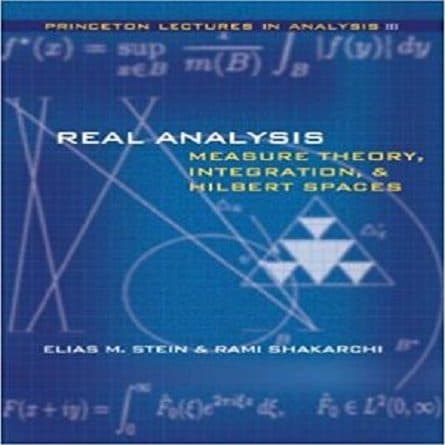CSULB – Comprehensive Exam Preparation – Fall 2018
Real Analysis – CSULB
1. Fall 2018 Choose six of the nine problems. On the first page of your work, please write the numbers of the problems that you want to be graded.\ Notation: for $A$ a measurable subset of $\mathbb{R}^d$, $\lambda(A)$ is the Lebesgue measure of $A$.
Problem 1.
- State Fatou’s Lemma and the Dominated Convergence Theorem.
- Assume Fatou’s Lemma is true. Prove the Dominated Convergence Theorem.
Proof .
Problem 2. Show that the sequence of simple functions $f_i: \R \to \R$, $f_i(x) = \begin{cases} -1 & \text{ on } i\leq x \leq i+1, 0 & \text{ elsewhere } \end{cases} $ satisfies $$\liminf_{i \to \infty}\int_{\R}f_i d \lambda < \int_{\R}\liminf_{i \to \infty}f_i d\lambda$$ State why this does not violate Fatou’s Lemma.
Proof . Note that for a fixed $x \in \R$, we have $\liminf_i f_i(x) = \sup_{i \geq 0} {\inf_{n \geq i}{f_n(x)}}=\sup_{i \geq 0}{\inf_{n \geq i}{-1,0}}$ (This is because as $x$ is fixed and $n$ moves, there will be multiples intervals $[n,n+1]$ so that $x$ is not in these intervals, so $f(x)=0$ on this domain, and there is one $n$ so that $x \in [n,n+1]$ so $f(x)=-1$ on this particular interval). Going back to the $\sup_{i \geq 0}{\inf_{n \geq i}{-1,0}}$, this is equal to $\sup_{i \geq 0}{-1,0} =0$. Thus $\liminf_i f_i(x)=0$, so the RHS = $\int_{\R} 0 d \lambda =0$.
Now, $\int_{\R}f_i(x) d\lambda = \int_{i}^{i+1} (-1) d \lambda = (i – (i+1))=-1.$ So LHS =$\liminf_i {-1}=-1$. Thus LHS $<$ RHS. This does not violate Fatou’s Lemma because $f_i$ is not non-ngegative for all $i$.
Problem 3. If $\lambda$ is Lebesgue measure on $R$ and $E$ is a measurable set with $\lambda(E) < \infty$, show that for every $\epsilon >0$ there exists an open set $U \supset E$ with $$\lambda(U – E) < \epsilon$$
Proof . This is a confusing problem. This is definition in Stein’s book and Zygmund’s book.
Problem 4. Prove that continuous $g: \R^n \to \R$ is Borel measurable by considering the set $$G = \{U \subseteq \R \text{ }| \text{ } g^{-1}(U) \text{ is Borel} \}$$ and by doing the following:
- Show that open sets are in $G$.
- Show $G$ is a $\sigma$-algebra.
Proof . 1, Let $O$ be an open set in $\R$. Then $O$ is also a Borel set. As $g$ is Borel measurable, so $g^{-1}(O)$ is also Borel. Thus $O$ is an element of $G$. As $O$ is arbitrary, we conclude that every open set is in $G$.\
- We need to show that $G$ is closed under complement and countable union. Let $U$ and $U_1,U_2,\ldots$ be in $G$. Then $g^{-1}(U)$ is Borel and $g^{-1}(U_i)$ is Borel for all $i$. Now then $g^{-1}(\R-U)=g^{-1}(\R) -g^{-1}(U) =\R^d – g^{-1}(U)$. Since $U \in G$ so $g^{-1}(U)$ is a Borel set, thus its complement $\R^d – g^{-1}(U)$ is also Borel set. So $\R -U$ is also in $U$.\ In addition, $$g^{-1}(\bigcup_{i=1}^{\infty}U_i)=\bigcup_{i=1}^{\infty}g^{-1}(U_i)$$ And since $U_i \in G$, so $g^{-1}(U_i)$ are all Borel, thus their countable union is Borel. Hence $g^{-1}(\bigcup U_i)$ is Borel, so $ \bigcup U_i$ is in $G$.
Problem 5. Let $f$ and $f_k$, $k=1,2,3\ldots$ be measurable and finite a.e. in measurable set $E$. Show that if $f_k \to f$ a.e. in $E$ and $\lambda(E) < \infty$, then $f_k \xrightarrow{\text{m}} f$ (converges in measure) on $E$.
Proof . Let $\epsilon >0$ be given. By Egorov theorem, there exists $A_{\epsilon} \subset E$ such that $f_k \to f$ uniformly on $A_{\epsilon}$ and that $m(E-A_{\epsilon}) < \epsilon$. Since $f_k \to f$ uniformly on $A_{\epsilon}$, there exists an $N \in \N$ such that for all $n \geq N$, for all $x \in A_{\epsilon}$ then $|f_n -f| < \epsilon$. Then
$$m({x \in E: |f_n -f| \geq \epsilon}) =m({x \in A_{\epsilon}: |f_n -f| \geq \epsilon}) + m({x \in E – A_{\epsilon}: |f_n -f| \geq \epsilon})$$
Choose $n >N$ as above. Then $|f_n-f| < \epsilon$ for all $x \in A_{\epsilon}$. So $m({x \in A_{\epsilon}: |f_n -f| \geq \epsilon})=0$. In addition $m({x \in E – A_{\epsilon}: |f_n -f| \geq \epsilon}) \leq m({x \in E-A_{\epsilon}}) < \epsilon$. Thus $m({x \in E: |f_n -f| \geq \epsilon}) < \epsilon$ for all $n$ large. And thus $f_n \to f$ in measure on $E$.
Problem 6. Suppose that $0 \leq f_k(x) \leq f_{k+1}(x)$ for all $k \in \N$ and all $x \in E-Z$ for some $Z$ with $\lambda(Z) =0$. If $f_k \xrightarrow{\text{m}} f$ (converges in measure) on $E$, prove that $f_k \to f$ a.e. in $E$.
Problem 7.
- Suppose $f$ is integrable function on $E$ and suppose that $f \geq 0$ on $E$. For $\alpha >0$, define $E_{\alpha}= {x \in E: f(x) > \alpha}$. Prove that: $$\lambda(E_{\alpha}) \leq \frac{1}{\alpha}\int_E f.$$
- Suppose that $f\geq 0$ on $E$ and $\int_E f =0$. Prove that $f(x)=0 $ almost every where on $E$.
Problem 8. Let $f$ be an extended real-valued integrable function defined on $\R^n$. For every $k \in N$, set: $$f_k(x) = \begin{cases} f(x) & \text{ if } |f(x)| \leq k k & \text{ if } f(x) > k -k & \text{ if } f(x) < -k \end{cases}$$
- Show that $\int_{\R^n}f_k \to \int_{\R^n} f$.
- Use part (1) to show that for every $\epsilon >0$ there exists $\delta >0$ such that\ if $\lambda(E) < \delta$ then $|\int_E f| < \epsilon$.
Problem 9. Suppose that $f$ is integrable on $[0,\infty)$. Prove that $$\lim_{n \to \infty}\int_0^{\infty}\frac{xf(x)}{n+x}dx =0$$
Proof . Use $ |f(x)| $ and the Dominated convergence Theorem to interchange the limit and the integral with $f_n(x):=\frac{xf(x)}{n+x}$. Then $|f_n(x)| \leq |f(x)|$ for all $n$ because $\frac{x}{n+x} \leq 1$ and $x \geq 0$. Also as $f$ is integrable so $|f(x)|$ is also integrable. Also note that $\lim_{n \to \infty} f_n(x) = 0$. Thus by the Dominated Convergence Theorem, we have $\lim_n \int f_n = \int \lim_n f_n$, and so: $$\lim_{n \to \infty}\int_0^{\infty}\frac{xf(x)}{n+x}dx=\lim_{n \to \infty}\int_0^{\infty}f_n(x)=\int \lim_{n \to \infty} f_n(x) = \int 0 =0$$.

